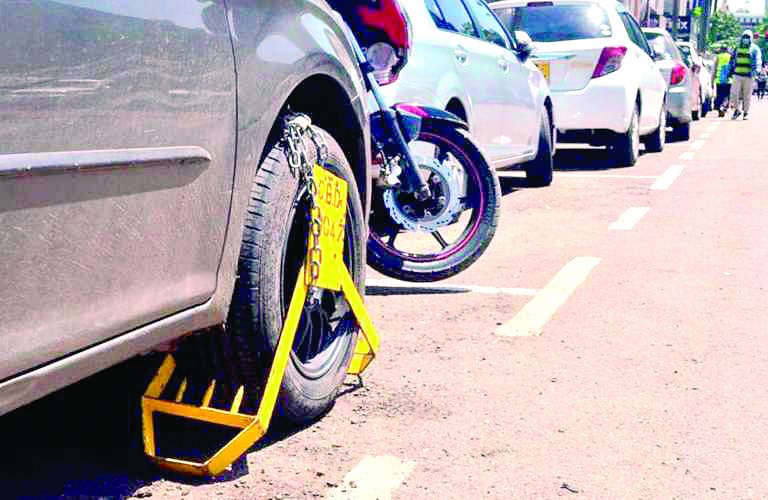Nightmare that is Nairobi’s endless parking headache

In Nairobi, car parking is not just about where to leave your car. It’s a daily contest of power, privilege, patience—and sometimes pure survival.
And like everything else in the capital, the rules are unwritten, often unfair, and always changing.
Whether it’s a boda boda squeezing between sport utility vehicles (SUVs) in Westlands, a clerk dodging clamps in the Central Business District (CBD), or a Lexus driver double-parking at a mall, everyone is playing the parking game.
And behind every parking space, there’s a story.
One of Nairobi’s most feared sights is the bright yellow clamp. It creeps up silently, usually when you’ve just “popped in for five minutes.”
The Nairobi City County’s parking enforcement team—sometimes called the “clamp squad” —is as efficient as it is controversial.
You park, they clamp, you call a number, you wait, and then part with Sh2,000 or more. The irony? Sometimes it’s not even clear if you violated any rule.
“Honestly, we’re just doing our job. But there’s pressure. We have daily targets. Some of us even compete to see who hits quota fastest,” a city enforcement officer who asks to remain unnamed says.
Parking fines have become a solid source of income for the county, but for motorists, they are a daily pain point. Many complain that signage is poor or missing, mobile money payment systems sometimes fail, and appeals rarely succeed.
While the county fights for control, another group has quietly claimed their share of the city: the “parking boys.”
These are the young men who “guide” you into tight spots, keep watch over your car, and expect a tip—usually Ksh20-Ksh100.
The parking boys
In areas like Kilimani, Gikambura, and Pangani, parking boys are more than just casual hustlers.
They form their own informal networks, controlling entire stretches of roadside real estate. Some are polite, some aggressive, and a few have connections with rogue police or matatu gangs.
Kelvin, a 25-year-old parking boy in South B, says the work pays better than most casual jobs.
“I can make up to Ksh1,000 on a good day. Some drivers ignore you. Others give you Ksh50 without asking. But we also deal with county askaris, rival boys, and rude drivers. It’s not easy,” he says.
In some estates and markets, residents have started hiring their own attendants or placing barriers to stop strangers from claiming “their” spots.
It’s unregulated, but so far, widely accepted. After all, in Nairobi, whoever shows up first is often the “owner.”
Hushed class system
There’s also a quiet class system written into the city’s parking spaces. At malls like Two Rivers and Garden City, high-end car owners get priority basement or shade parking—some even have valet service.
Meanwhile, boda boda riders are restricted to designated zones and often chased off if they linger too long.
In Nairobi CBD, street parking is often full by 8 am, and many drivers now pay monthly season tickets to secure parking slots.
But even those come with their drama—someone else may park in your spot, and there’s little recourse.
Some companies have taken matters into their own hands, offering private parking towers for staff.
A few tech start-ups even offer bonuses for employees who avoid driving altogether, in an effort to reduce the headache.
Several apps have tried to solve Nairobi’s parking crisis. Platforms like MojaPay, Panda Parking and ParkUp offer digital booking, location tracking, and cashless payments.
But adoption has been slow outside of private spaces, and county integration remains weak.
Instead, Nairobians rely on “hustle maps”—an internal mental GPS of where you can find space at different times.
For example, at Prestige Plaza on Ngong Road, upper-level rooftop slots are usually free before noon. On the same road, there’s a certain Shell petrol station that becomes an unofficial parking lot after 5:30 pm.
In Hurlingham, some pharmacies and clinics rent out “free customer parking” for evening meet-ups. The city runs on such hacks.
Parking in Nairobi also reveals deeper questions about how we build our cities. Roads are wider, but pavements disappear.
New malls and apartments are built with very few parking slots, pushing cars onto roads. And green spaces like Uhuru Park are sacrificed for tarmac.
At the heart of it all is a city designed for cars, not people. Yet, Nairobi has more than 500,000 registered vehicles—and growing.
And with middle-class car ownership on the rise, the demand for parking will only get worse.
Need for organisation
Urban planner Njeri Muturi says parking needs to be seen as a public service, not a punishment.
“Right now, we treat parking as a way to collect fines or bribes. We need to rethink how people move, and make parking part of a cleaner, more organised system,” she says.
Some changes are coming though. The county has partnered with tech firms to map legal parking zones. There are pilot projects in Westlands to create paid parking towers.
And some buildings now share real-time space updates to help reduce congestion.
But for a majority of motorists in Nairobi, the daily parking hustle will remain.















